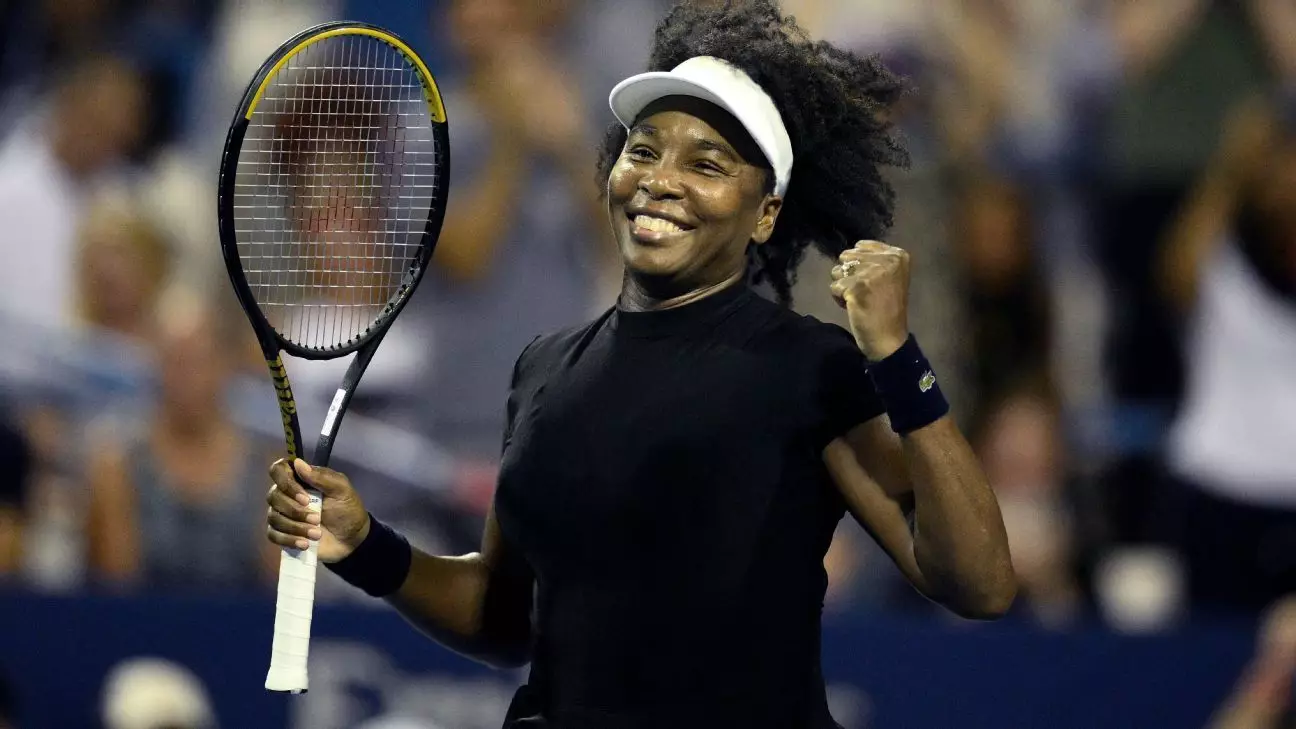Venus Williams’ upcoming appearance at the US Open marks more than just a return to competitive tennis; it symbolizes resilience, determination, and unyielding passion. At 45 years old, her inclusion as a wild-card entry breaks age barriers and challenges societal perceptions about aging and athleticism. While her career boasts numerous Grand Slam singles titles, it’s her relentless spirit that continues to inspire fans and competitors alike. Her comeback after a two-year hiatus isn’t merely a personal milestone but a powerful statement about perseverance in the face of adversity.
Her journey to this point has been arduous. After battling injuries, surgeries, and the natural decline that confronts all athletes with age, Williams refuses to cede her place on the court. Her recent matches, although modest in success, have demonstrated significant progress. Her win at the DC Open — becoming the oldest woman to score a tour-level singles victory since Martina Navratilova’s 2004 Wimbledon feat — exemplifies her refusal to be defined by setbacks. Instead, she redefines resilience and proves that determination can defy the relentless march of time.
Aging Gracefully and Powerfully in a Demanding Sport
Tennis is a physically demanding sport that often favors the young, yet Williams’ participation disrupts this narrative. Her physicality, combined with strategic intelligence and mental toughness, counters the stereotype that aging diminishes sporting excellence. She is not only returning to compete at her previous level but is actively working to enhance her power and speed, underscoring her commitment to improvement and adaptation.
Remarkably, Williams’ decision to compete again isn’t fueled solely by a desire for glory but also by a personal resolve to prove that age is no barrier. Her statement after Cincinnati, claiming she feels “amazing” and ready to work on her strengths without the fear of injury, serves as a testament to her disciplined mindset. She embodies the idea that perseverance, paired with adaptability, can defy the typical decline associated with aging athletes.
Her focus on health, recovery, and strategic training highlights a broader trend amongst athletes refusing to retire quietly. Instead, they redefine their careers, demonstrating that greatness isn’t confined to youth but is sustained through resilience, passion, and innovation. Williams’ story resonates deeply, serving as a powerful narrative for anyone facing their own hurdles.
Challenging Expectations and Reasserting Her Legacy
Throughout her career, Venus Williams has shattered expectations and records, often defying the odds through sheer tenacity. Her return to the US Open at 45 is another chapter in her legacy of defiance against aging stereotypes in professional sports. It questions the conventional belief that once an athlete hits a certain age, their prime is over and retirement inevitable.
Moreover, her participation underscores the importance of mental resilience. She has encountered numerous setbacks—injuries, surgeries, and the pressure of competing alongside younger players—and yet, she remains committed to her craft. This resilience redefines what it means to be a competitive athlete in the modern era: it’s not just about physical prowess but also about mental fortitude, purpose, and a refusal to be sidelined by societal expectations.
Her journey invites a broader reflection on how the sports community values experience and perseverance. In an age obsessed with youth and fleeting fame, Williams reminds us that tireless dedication can extend a career and elevate an athlete’s influence beyond the game itself. Her story is an inspiring testament to the power of resilience and the unyielding human spirit.
The Broader Impact of Her Comeback
Venus Williams’ return to the spotlight isn’t solely about boosting her career. It signifies a cultural shift, advocating for age diversity and challenging stereotypes about aging in sports. As the oldest entrant in the US Open singles since 1981, her participation shines a light on the importance of inclusivity and the breaking down of ageist barriers.
Additionally, her story brings renewed attention to issues such as health, recovery, and mental health for athletes. Her openness about her surgeries and struggles fosters a broader conversation about the importance of resilience in overcoming personal and professional challenges. It encourages older athletes and those facing adversity to believe in their potential, regardless of societal expectations or age limitations.
Williams’ active engagement in competitive tennis at this stage underscores an essential truth: the journey is as meaningful as the destination. Her presence on the court at the US Open will be remembered not solely for her victories but for embodying the indomitable human spirit that refuses to give up, no matter how challenging the path becomes.


Leave a Reply